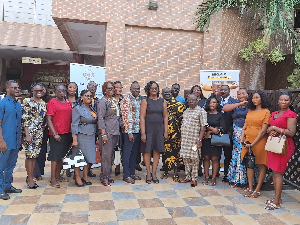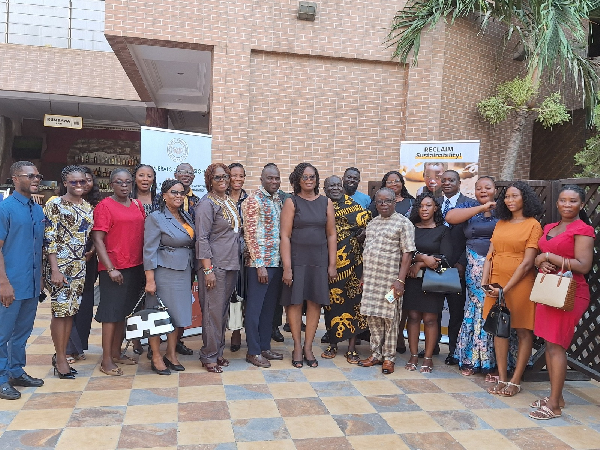 Members of the NPF in a group photo after the meeting
Members of the NPF in a group photo after the meeting
Awulae Angama Tu Agyan II, the Omanhene of the Gwira Traditional Area in the Western Region, has emphasized the need for chiefs and traditional authorities to play an active role in efforts to eradicate child labour in the mining industry.
Speaking to journalists on the sidelines of a National Partners Forum (NPF) to deliberate on ways of effectively implementing the Child Labour Eradication Program (CLEF) created by the Minerals Commission and Solidaridad West Africa, Awulae Tu Agyan noted that chiefs, as the custodians of land, should be leading the fight against child labour in the mining sector.
Awulae Tu Agyan, who is the representative of the National House of Chiefs on the NPF, commended the Minerals Commission and its partners for recognizing the important role of chiefs in the implementation of policies.
He argued that as the primary figures of authority in society, chiefs serve as a link between the grassroots and the nation, and that excluding them from policies such as the CLEF creates a managerial gap and challenges in its implementation.
He therefore appealed to chiefs, particularly those in the mining areas, to embrace the move by the Minerals Commission and help curb the menace, which he lamented is a key feature of Ghana’s mining industry.
“Child labour in the mining industry is a major challenge that we must endeavor to address before it gets out of hand. I believe this forum is a good step and it has sparked an interest in me to commit to fighting the problem. Health practitioners have been warning us of various health issues related to the exposure of children in the mining industry.
“We need to address this issue before it gets out of control. One reason we are experiencing these issues is the breakdown of social values. Previously, Ghanaian society had strong values that addressed these issues, but unfortunately, we’ve allowed those values to vanish and we are suffering the consequences. We, the chiefs, have a responsibility and we must fight it,” he said.
Madam Monalyn Anokye-Bempah, Principal Officer at the Gender Unit, Minerals Commission, noted that while the laws of the country prescribe effective ways of dealing with child labour in the mining sector, it is imperative that the commission moves strategically as the situation is a complex one that requires a multifaceted approach.
She highlighted a number of factors leading to the involvement of children in mining and recommended the CLEF as the most effective way of dealing with the situation.
Madam Anokye-Bempah noted that CLEF proposed various ways and also emphasized the importance of stakeholder collaborations in combating the problem.
Eric Oteng Agyara, a representative of Solidaridad West Africa, stated that while gold has been a huge blessing to Ghana, it is important that the country focuses on addressing the challenges that come with it.
He expressed conviction that the CLEF will lead to an astronomical decrease in the number of children involved in mining activities across the country.
The CLEF is a document developed by the Minerals Commission and Solidaridad Ghana with the aim of reducing child labour in the mining sector.
With over 5,000 children confirmed to be engaged in mining activities across the country, CLEF spells out multiple ways of reducing the number to 2,500 in the next four years.
GA
